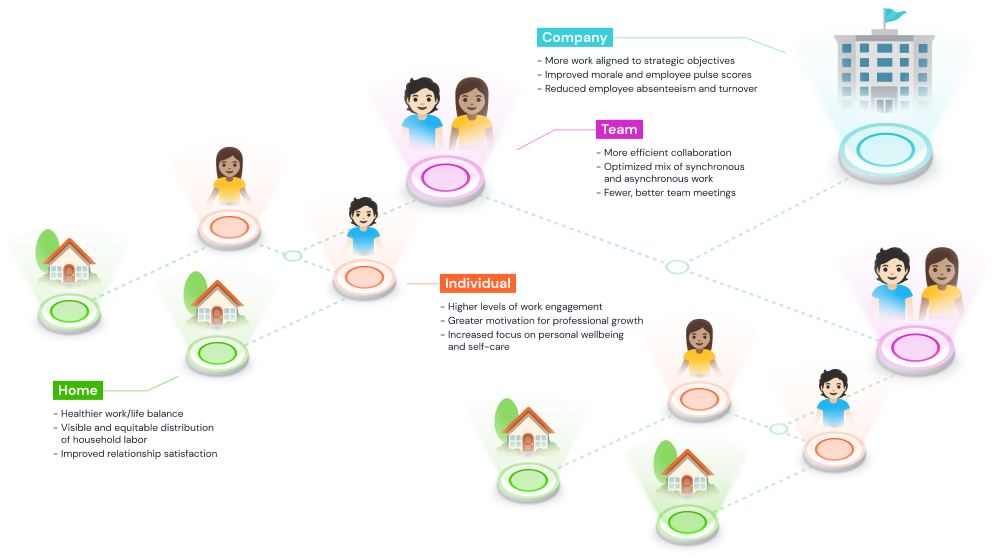
The Butterfly Effect 🦋of Adaptability & Resilience Skills
10 min
January 27, 2023 · 7 min

When we first started BillionMinds, we did a lot of teaching. It’s not surprising – we had a lot of information we wanted to share about how to excel at remote work, and teaching was a great way to get it out. But after a few months, something was troubling us. Was all of this great information we were sharing actually leading to any different behaviors? Were people actually doing ANYTHING materially different than before?
So we decided to find out, and frankly, the results were pretty disappointing. Sure, we found some people who had been really positively impacted by our teaching, but many people were pretty much unchanged from before. Some were actually LESS happy. They KNEW what they needed to change, but they felt unable to act on it in any meaningful way.
What were we doing wrong? After lots of interviews and additional research, we realized we were failing our students in a bunch of different ways including:
As we learned all this, we also figured out something even more profound. Almost every attempt to teach people soft skills in business today is fundamentally flawed. We started asking people about personal productivity books or personal development books they had read, offsites they had attended, and almost every time the same pattern emerged – some knowledge garnered, a few insights gained, but nothing fundamentally changing, except making the student more disappointed in themselves. Self-help basically doesn’t work, because as a species we aren’t particularly good at figuring out HOW to help ourselves.
But there is good news hidden among all this disappointment. For centuries we’ve known how to ACTUALLY move beyond book learning and into behavior change. Blacksmiths know, carpenters know, pianists know, and if you have ever driven a car or taken a golf lesson YOU instinctively know. What all of these have in common is how you embed the skills. It’s through practice, and with each practice session building on the last. You move from apprentice to master, and very little of how you get there is in a book. Building soft skills is almost exactly the same.
So, using these ideas as a starting point, we created some basic principles, that now form our approach to soft skills development – something we now follow resolutely in our Remote Work Skills Development platform. Here are the principles we use every day…
None of these principles are rocket science, but it’s pretty staggering how much as individuals and organizations we spend on supposed solutions that ignore most or even all of them. Any personal productivity book you have ever bought probably tells you EXACTLY how you should implement its findings, ignoring that you are different from the author. Every offsite you have been to bombards you with knowledge only for you to forget 90% of what you have learned within a week. And beyond an opaque exam, almost no solutions provide you with any form of feedback that you are actually doing things better.
So before you beat yourself up over not being the better person the latest self-help book told you you could be – remember, the problem is almost certainly not the student, it’s the teacher.
No, but you need discipline. First, validate that the author’s approach can work for you (don’t just take their word for it). Once you have decided to continue, slow down your reading (often dramatically) to ensure that you are really absorbing the information. If the book has exercises, do them. If not, create your own exercises. Once you’ve completed the exercises reflect on what you have learned, and don’t move forward until you have done them. Reading and implementing the changes in one good book will be worth way more than reading 10 average ones.
Absolutely! Once the behavior is embedded then you can maximize the benefit it brings with more theoretical knowledge. Think of it like being a great piano player. Once the pianists master their craft, they can take any piece of sheet music and play it well with minimal practice. But it ONLY works in that order
At this point, we’ve discovered five that are common across all great remote workers. These are: Organization, Control, Motivation, Balance and Resilience. For more details see our article – 5 Skils for Remote Work and Work From Home.
Many things. It allows us to make shortcuts because we know in advance what will work and what will not. And it allows us to perform rapid thought experiments before expensive trial and error. Knowledge is a beautiful thing, it’s just not the complete recipe for soft skills development.